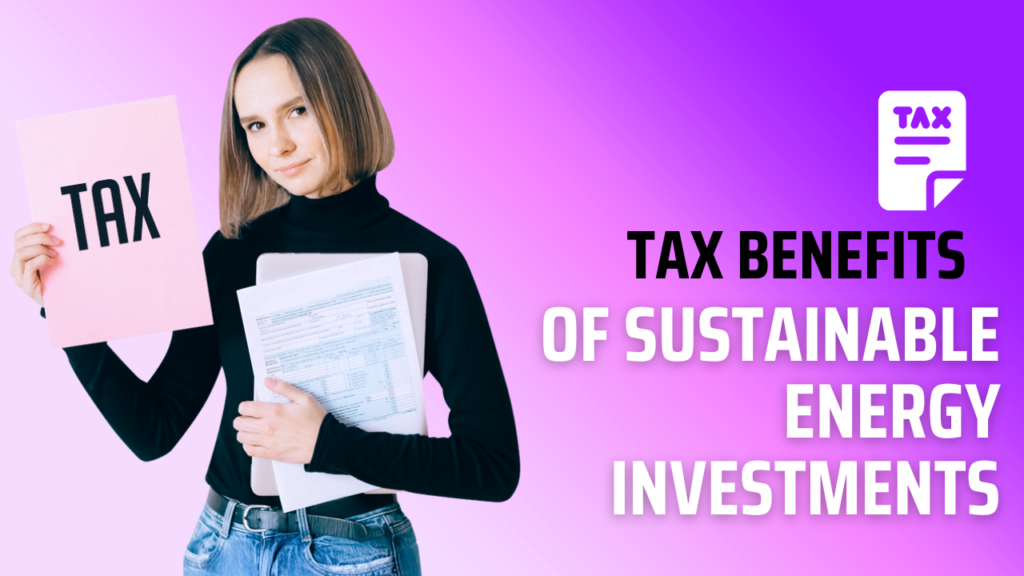
Sustainable energy investments are more than just an eco-friendly choice—they’re also a savvy financial decision. In 2024, governments worldwide are continuing to incentivize green initiatives, offering significant tax benefits of sustainable energy investments to both individuals and businesses.
This guide breaks down these benefits, how to qualify, and why sustainable energy is a win for your wallet and the planet.
Why Invest in Sustainable Energy?
The shift toward renewable energy sources like solar, wind, and geothermal isn’t just a trend; it’s a global priority. By investing in sustainable energy in 2024, you’re contributing to a greener future while unlocking:
- Tax incentives and rebates
- Reduced energy bills
- Increased property value
- Long-term investment returns
Whether you’re an individual homeowner or a business owner, sustainable energy offers unparalleled financial and environmental advantages.
Key Tax Benefits of Sustainable Energy Investments in 2024
Governments across the globe are introducing and expanding tax breaks to encourage renewable energy adoption. Below are the primary tax benefits available in 2024:
1. Federal Tax Credits for Renewable Energy
In the U.S., the Investment Tax Credit (ITC) is one of the most attractive benefits for renewable energy investments:
- 30% Credit: Homeowners and businesses can claim 30% of the cost of installing solar, wind, or geothermal systems as a tax credit.
- Eligibility: Applies to systems installed by December 31, 2034.
- Bonus Incentives: Additional credits may apply for using domestically produced materials.
2. Accelerated Depreciation for Businesses
Under the Modified Accelerated Cost Recovery System (MACRS), businesses can recover the cost of renewable energy installations through depreciation.
- Benefits: Significant tax savings over a shorter time frame.
- Example: Solar energy systems installed by businesses can benefit from a 5-year depreciation schedule.
3. State and Local Tax Incentives
Many U.S. states offer additional tax incentives, including:
- Property tax exemptions for the added value of renewable energy systems.
- Sales tax exemptions on equipment purchases.
- State-specific rebate programs.
4. Net Metering Tax Benefits
Homeowners and businesses generating excess renewable energy can sell it back to the grid, often receiving credits or payments that are tax-advantaged in many regions.
5. Energy-Efficient Home Improvement Tax Credit
Expanded under the Inflation Reduction Act (IRA), this credit allows homeowners to claim up to $1,200 annually for energy-efficient upgrades like heat pumps, energy-efficient windows, and solar panels.
Who Qualifies for Sustainable Energy Tax Benefits?
To qualify for the tax benefits of sustainable energy investments, individuals and businesses typically need to:
- Own the property where the renewable energy system is installed.
- Ensure the system meets government efficiency standards.
- Keep installation receipts and certification documents for tax filings.
Even renters may qualify in some cases if they invest in renewable energy systems via shared solar programs or energy cooperatives.
How to Claim Sustainable Energy Tax Benefits in 2024
Follow these steps to maximize your tax savings:
- Install a Certified Renewable Energy System
Ensure your solar panels, wind turbines, or other systems meet the standards set by your local or federal government. - Keep All Documentation
Maintain detailed records of purchase, installation, and system certifications. - Consult a Tax Professional
Work with a tax advisor familiar with renewable energy credits and incentives to ensure you claim every eligible benefit. - File Using the Correct Forms
For U.S. federal tax credits, use IRS Form 5695 when filing your taxes.
Sustainable Energy Investments Beyond Tax Benefits
Tax benefits are just the beginning. Investing in sustainable energy also offers:
- Energy Savings: Solar panels, for instance, can reduce electricity bills by up to 70%.
- Increased Property Value: Homes with solar installations typically sell for higher prices.
- Eco-Friendly Impact: Reduce your carbon footprint and contribute to a greener planet.
Final Thoughts
The tax benefits of sustainable energy investments in 2024 make it the perfect year to go green. From federal tax credits to local incentives, there’s never been a better time to invest in renewable energy.
Whether you’re upgrading your home, launching a green business initiative, or exploring investment opportunities, sustainable energy pays off both financially and environmentally.


